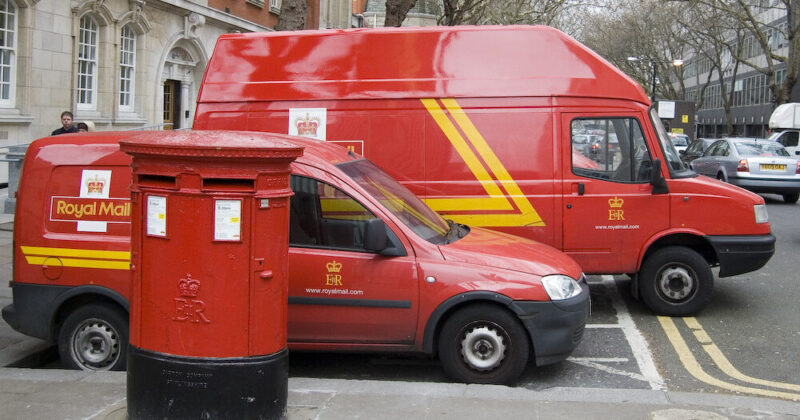

By a CWU rep
Royal Mail, the privatised postal service that has run for over 500 years, is in the headlines as workers in the Communications Workers Union (CWU) went on strike for pay after a record yes vote on a ballot, followed by a second 98.7% yes vote for action on terms and conditions.
Yet as videos and memes circulate, shared from loud and defiant picket lines, company bosses have been working in the shadows to fight back, with reports of secret negotiations to break up the company.
It has now become clear that nothing less than the future of Royal Mail itself is at stake, as well as the jobs and conditions of its 115,000 employees. Unions, Labour and postal user groups should demand the company is nationalised to protect this vital service.
“Terry’s on fire!”
Postal workers anger has built up through months of legally-binding negotiations and ballots. Company manoeuvres forced the CWU to hold two ballots in a row, one on pay, a second against sweeping changes to terms and conditions. No strikes have yet been called on these issues.
After imposing a 2% pay rise—a 10% pay cut in real terms as inflation hits 12%—CEO Simon Thompson upped the ante, claiming the company was losing £1 million a day (after making £758 million last year!)
This didn’t stop the board awarding Thompson (and itself) six-figure bonuses, the shareholders over £400 million in dividends earlier this year! The bosses have no shame.
As a result, the first two days of pay strikes at the end of August were solid, with few if any staff going to work. From fancy dress to barbeques and dance moves, a postal workers’ anthem penned by a guitar-strumming postie to a full-blown rave in the streets outside a London CWU rally (‘Terry’s on fire!’, sung to 1990s club anthem ‘Freed from Desire’), the strike has seen an outpouring of support, joyful and defiant, from workers finally ready and able to fight it out with their exploiters.
Many agencies have refused to cross picket lines after the strikers argued for solidarity, throwing a spanner in Royal Mail’s works and forcing them to draw on managers from every corner of the business to get out a few special deliveries, while the delivery and sorting offices pile up mail and parcels.
Two days of strike action in early September will create more chaos, amplified by rising mail volumes in the run up to the Christmas season. The bosses’ refusal to even negotiate with the workers means that Royal Mail might lose parcels contracts, while Ebay has already informed customers that parcels could be delayed unless they switch to other services. Postal bosses are starting to sweat!
Pay or modernisation?
Huge public support for strikers, including postal workers, has forced management to try a new tack. Trying to separate Royal Mail from the growing wave of cost-of-living pay strikes, Executive Chairman Keith Williams argues that this is really about ‘modernisation’. ‘There are a lot of strikes across the country right now, but what I want to be clear about is this one is different.’ Although Williams’ aim in saying this is to isolate Royal Mail workers from the rest of the working class, there is an element of truth in his argument.
They claim Royal Mail now makes more revenue from parcels than the gradually diminishing letters. This may be true, but as managers have repeatedly stated in previous years, by delivering the two streams together, Royal Mail is able to have a cost advantage.
Plans to turn Royal Mail into a parcel company like its international wing GLS, with a separate service of parcels-only drivers, means cutting wages and working conditions to match the competition in DPD and Amazon. Royal Mail’s boasts that it has the best pay and conditions in the industry have been replaced by the old refrain that posties are overpaid and underworked.
That’s why Thompson refused to answer when he was asked twice in an interview whether Royal Mail bosses were in secret negotiations to break up the company, and the government has been forced to investigate the shadowy hedge fund Vesa, operating out of tax haven Luxembourg and owned by Royal Mail’s biggest shareholder, the billionaire Daniel Krestinsky.
Keith Willliams confirmed this blackmail to staff: “We will look for significant operational change or split the company”, breaking off the lucrative GLS which profits from workers on fake self-employed contracts working up to 14 hours a day, and forcing Royal Mail into a sink or swim fight, causing a race to the bottom in terms of pay.
But the Tories won’t save Royal Mail from being carved up, or the universal service obligation from being cut. The CWU must use the strikes to loudly demand that the government renationalise Royal Mail, rather than diplomatically keeping silent in hopes for a deal; and escalate the strikes, building public support into solidarity with appeals for solidarity committees, action and funds.